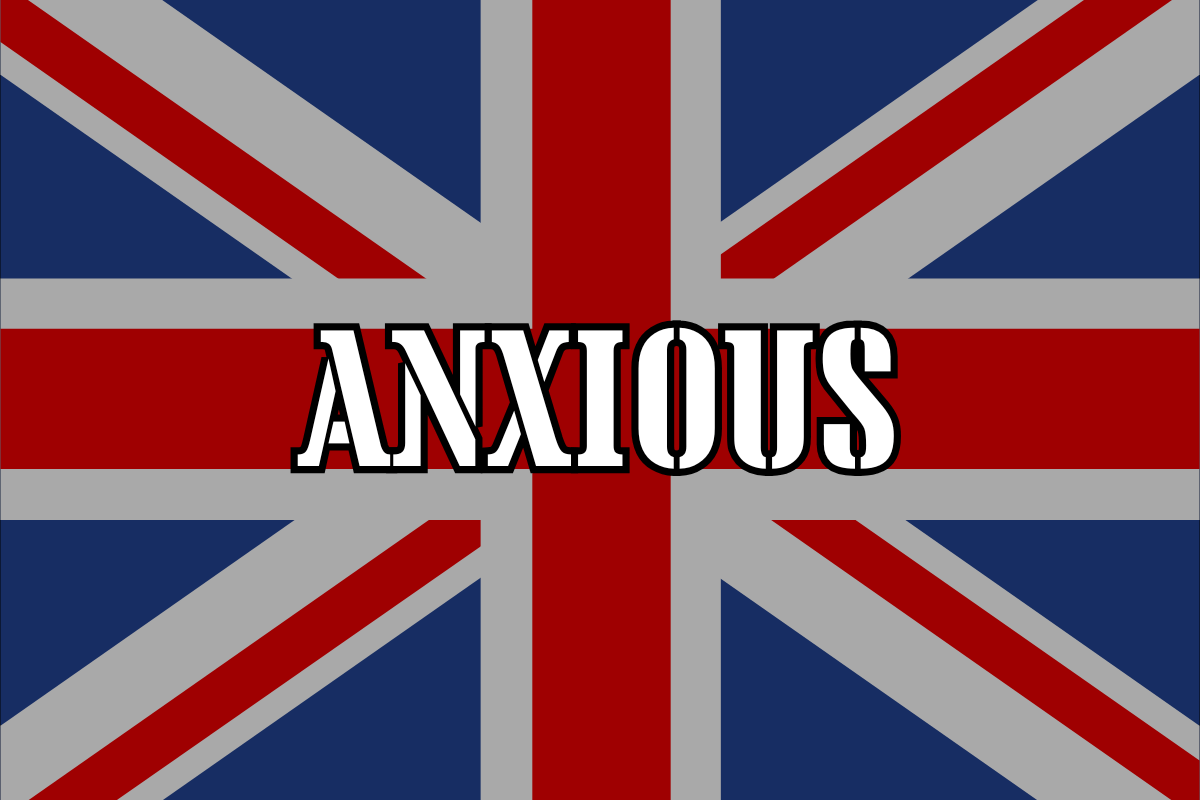Ever felt your stomach twist into knots over an upcoming event or spent a sleepless night playing out ‘what ifs’ in your head?
You’re not alone.
Across the pond in Britain, they’ve turned the universal experience of worry into an almost art form, with a slew of phrases that range from the endearingly quirky to the downright bizarre.
Whether it’s fretting about the weather or feeling jittery before a big meeting, there’s a British slang term that captures the essence of that worry.
So, grab a cuppa and join us as we explore the rich variety of ways Brits express their concerns, anxieties, and those moments when they’re simply “having kittens.”
Let’s get started!

British Slang For Worried
Agitated

“Agitated” describes a state of nervousness or unrest, often visible in one’s behavior or speech.
It’s used when someone cannot stay calm, possibly due to worry or anxiety about something specific.
Examples in sentences:
- “She became agitated as the deadline approached, pacing back and forth.”
- “His voice was agitated, betraying his calm exterior.”
- “The crowd grew agitated waiting for the concert to start.”
- “He was visibly agitated during the meeting, constantly checking his phone.”
- “After the argument, she felt agitated for the rest of the day.”
All of a dither

“All of a dither” is a particularly British way of saying someone is flustered or overly excited, to the point where making decisions becomes difficult.
It often involves a mix of anxiety and excitement.
Examples in sentences:
- “She was all of a dither trying to choose the perfect outfit for her date.”
- “The morning of the move, the whole family was all of a dither.”
- “Faced with so many options, he was all of a dither about which to choose.”
- “The surprise party left her all of a dither, overwhelmed by emotions.”
- “As the deadline loomed, the team found themselves all of a dither.”
Antsy

“Antsy” is often used to describe a feeling of restlessness or impatience, usually because of anticipation or a long wait.
It’s the kind of nervous energy that makes it hard to sit still.
Examples in sentences:
- “Waiting for the exam results, she felt increasingly antsy.”
- “The kids get antsy if they have to stay indoors too long.”
- “He was antsy before the interview, rehearsing his answers.”
- “As the hours passed without any news, the family grew antsy.”
- “I always get antsy before a long flight, just wanting to get going.”
Anxious

“Anxious” describes a feeling of worry about an imminent event or something with an uncertain outcome.
This term is often used in both casual and formal contexts to express concern about future events.
Examples in sentences:
- “She felt anxious about the first day at her new job.”
- “The closer it got to his performance, the more anxious he became.”
- “Anxious parents waited outside the school for news.”
- “I’m really anxious to hear back from the university.”
- “The uncertain weather made her anxious about the weekend camping trip.”
Beside Oneself

“Beside oneself” is used to express a high degree of emotional turmoil or excitement, to the point where one feels almost outside of their own body.
It’s often associated with worry, but can also relate to positive emotions.
Examples in sentences:
- “She was beside herself with worry when her son didn’t come home on time.”
- “When he won the award, he was beside himself with joy.”
- “They were beside themselves waiting for the test results.”
- “I was beside myself when I realized I’d lost my passport.”
- “The fans were beside themselves when the band announced their reunion.”
Biting Their Nails
“Biting nails” is a common expression and habit associated with worry or stress.
It’s often an unconscious reaction to anxiety, serving as a physical indicator of one’s inner state of unease.
Examples in sentences:
- “She was biting her nails throughout the entire horror movie.”
- “Waiting for his turn to speak, he found himself biting his nails.”
- “Biting nails became a habit during exam periods.”
- “He noticed her biting her nails and realized she was more nervous than she let on.”
- “To stop biting her nails, she started using a special nail polish.”
Distressed
“Distressed” goes beyond general worry to describe a deep emotional suffering or turmoil. It’s used in situations of significant stress or upset, where the worry has a profound impact on one’s well-being.
Examples in sentences:
- “The news of the accident left her feeling deeply distressed.”
- “He sounded distressed on the phone, which worried me.”
- “Seeing the distressed look on her face, he immediately offered help.”
- “The distressed animal was quickly attended to by the vet.”
- “They launched a support group for distressed students.”
Edgy
“Edgy” describes a state of being on edge, where one feels restless or jittery, often due to anxiety or anticipation. It captures the feeling of being unable to relax, possibly snapping at minor provocations.
Examples in sentences:
- “The suspenseful music made her feel edgy and tense.”
- “He was edgy waiting for the interview, tapping his foot constantly.”
- “The whole team was edgy before the big presentation.”
- “She gets edgy whenever the topic is brought up.”
- “The edgy atmosphere in the room was palpable as they awaited the decision.”
Freaking out
“Freaking out” is a vivid expression used to describe a strong emotional response to stress, fear, or excitement. It implies a loss of composure, where worry or anxiety overwhelms rational thought.
Examples in sentences:
- “She started freaking out when she realized she had lost her keys.”
- “I’m freaking out about the amount of work I have to do by tomorrow.”
- “He was freaking out over the spider in his room.”
- “They were freaking out with excitement about the concert tickets.”
- “Freaking out, he called for help when he saw the water rising.”
Fretting
“Fretting” implies a more prolonged state of worry, often about things that may not warrant such concern. It suggests a nagging, persistent unease that preoccupies the mind, sometimes over minor issues.
Examples in sentences:
- “She spent the whole week fretting about her speech.”
- “He was fretting over the details, wanting everything to be perfect.”
- “Stop fretting; I’m sure they’ll love your gift.”
- “They were fretting about the weather, but the day turned out fine.”
- “Fretting about the future, he found it hard to enjoy the present.”
Having kittens
“Having kittens” is a particularly vivid British expression for being in a state of high anxiety or worry, often over something that might not seem as worrisome to others. It suggests an almost exaggerated level of distress.
Examples in sentences:
- “She was having kittens waiting for the exam results to be posted.”
- “I’m going to have kittens if they don’t call back soon with the news.”
- “He was having kittens over the thought of meeting her parents.”
- “They were having kittens about the slight delay, fretting over every minute.”
- “My mother had kittens when she saw the state of my room.”
In a flap
“In a flap” describes a state of nervous excitement or agitation, where one might act in a hurried or confused manner due to worry or stress. It’s akin to being in a minor panic, often over something imminent.
Examples in sentences:
- “She was in a flap about getting everything ready on time.”
- “The whole office was in a flap the day before the audit.”
- “He got himself in a flap over the missing documents.”
- “They were in a flap trying to find the venue in time for the show.”
- “I found myself in a flap when I couldn’t find my passport.”
In a state
“In a state” is a broad term used to describe someone who is visibly upset, worried, or distressed about a situation. It implies a noticeable disruption to one’s usual demeanor, caused by anxiety or concern.
Examples in sentences:
- “She was in a state after hearing the unsettling news.”
- “Don’t get yourself in a state; we can sort this out.”
- “He arrived in a state, having been caught in the rain.”
- “They were in a state worrying about the safety of the trip.”
- “The cat was in a state during the fireworks, hiding under the bed.”
In a stew
“In a stew” suggests being in a state of worry or agitation that simmers over time, much like a stew cooking. It’s used to describe prolonged worry about a situation or outcome, often with a sense of brewing frustration or concern.
Examples in sentences:
- “He’s been in a stew all day about the upcoming meeting.”
- “She got herself in a stew over the weekend’s arrangements.”
- “They were in a stew, debating the best course of action.”
- “I spent all night in a stew, wondering if I’d made the right decision.”
- “The team was in a stew about the project’s direction.”
In a sweat
“In a sweat” literally refers to the physical manifestation of worry or nervousness, where one might sweat due to stress or anxiety. Figuratively, it describes a state of heightened concern about an issue or event.
Examples in sentences:
- “He was in a sweat before the presentation, practicing his speech repeatedly.”
- “She got in a sweat every time she had to drive in heavy traffic.”
- “The thought of the interview had him in a sweat all week.”
- “They were in a sweat trying to meet the tight deadline.”
- “I’m in a sweat about this whole situation; it’s not looking good.”
In a tizz
“In a tizz” captures a state of confusion or agitation, often over minor matters that get blown out of proportion. It’s akin to being in a minor frenzy, where worry makes it hard to think straight.
Examples in sentences:
- “The morning of the wedding, everyone was in a tizz.”
- “Lost his keys and was in a tizz until they turned up in the sofa.”
- “She got herself in a tizz over the smallest details of the party.”
- “Trying to get everything perfect, he was in a tizz all day.”
- “The mix-up at the airport left them in a tizz.”
In a tizzy
“In a tizzy” is similar to “in a tizz,” denoting a state of worry or excitement that leads to confusion. It often involves a flurry of activity or thought that lacks direction due to anxiety.
Examples in sentences:
- “She was in a tizzy trying to get everything ready on time.”
- “The unexpected guests threw him into a tizzy.”
- “Found her in a tizzy over the day’s schedule, which was packed.”
- “The news had everyone in a tizzy, wondering what would happen next.”
- “He’s always in a tizzy before a big exam, even if he’s studied.”
Jittery
“Jittery” describes a physical and mental state of nervousness, where one might feel shaky or on edge. It’s often used to describe the bodily sensation associated with anxiety, such as trembling or restlessness.
Examples in sentences:
- “Too much coffee made her feel jittery before the meeting.”
- “The night before the results were announced, he was jittery and couldn’t sleep.”
- “The tense atmosphere in the room made everyone feel jittery.”
- “She gets jittery whenever flying, no matter how short the flight.”
- “The prospect of speaking in public always left him feeling jittery.”
On pins and needles
“On pins and needles” describes a state of heightened anticipation mixed with anxiety, where one is nervously waiting for an outcome or event. It conveys the discomfort of uncertainty.
Examples in sentences:
- “Ever since the interview, I’ve been on pins and needles waiting for a call.”
- “The whole family was on pins and needles until they heard the news.”
- “Waiting for the test results had her on pins and needles all week.”
- “He was on pins and needles during the final moments of the game.”
- “The suspenseful movie had viewers on pins and needles from start to finish.”
Overwrought
“Overwrought” describes an excessive state of emotional agitation, often to the point of being unable to think clearly. It implies that the worry or stress has become so intense that it’s overwhelming.
Examples in sentences:
- “The overwrought parent fretted over every detail of the child’s day.”
- “After days of little sleep, she was feeling particularly overwrought.”
- “The news left him overwrought, pacing back and forth in distress.”
- “She became overwrought when she couldn’t find her passport.”
- “The overwrought atmosphere in the office made it hard to concentrate.”
Panicked
“Panicked” describes a state of sudden and intense fear or anxiety, often leading to irrational behavior or decisions. It’s the feeling of acute distress that compels one to act hastily.
Examples in sentences:
- “When the fire alarm went off, she panicked and forgot her belongings.”
- “He panicked at the thought of losing his job and called his boss immediately.”
- “The crowd panicked at the sound of the explosion, causing a stampede.”
- “She panicked when she realized she had missed her flight.”
- “Despite the emergency, it’s important not to panic and stay calm.”
Perturbed
“Perturbed” is used to describe a state of anxiety or disturbance over something that has happened or may happen. It implies a disruption of peace or calm, leading to worry or discomfort.
Examples in sentences:
- “She was perturbed by the strange noise coming from outside at night.”
- “The news of the sudden change in plans left him perturbed.”
- “I’m a bit perturbed about the meeting; it didn’t go as expected.”
- “He seemed perturbed by the questions about his past.”
- “The teacher was perturbed by the student’s unusual behavior.”
Rattled
“Rattled” describes a condition of being unnerved or disturbed, often as a result of an unexpected event or piece of information. It captures the sense of losing one’s composure or feeling shaken.
Examples in sentences:
- “The close call on the highway left her feeling rattled for hours.”
- “He was visibly rattled by the aggressive questioning.”
- “The sudden loud noise had everyone feeling a bit rattled.”
- “After the break-in, the whole family was rattled and uneasy.”
- “She managed to answer the questions, though she was clearly rattled.”
Spooked
“Spooked” implies being scared or startled in a sudden manner, often leading to anxiety or nervousness. It’s frequently used to describe a reaction to something unexpected or frightening.
Examples in sentences:
- “The ghost stories spooked him, and he couldn’t sleep all night.”
- “She was spooked by the shadows moving in the dark alley.”
- “The horse got spooked by the loud noise and bolted.”
- “After watching the thriller, they were too spooked to walk home alone.”
- “The sudden market drop spooked investors, leading to a sell-off.”
Stressed
“Stressed” is a widely used term to describe feelings of strain or pressure, often as a result of demanding circumstances. It encompasses both the physical sensations and mental state associated with being overwhelmed by worries or responsibilities.
Examples in sentences:
- “With the project deadline approaching, she was feeling increasingly stressed.”
- “He’s been stressed about finding a new job in the current market.”
- “The constant noise in the city makes me feel stressed.”
- “Balancing work and study has left him very stressed.”
- “She took up yoga to help manage her stressed state.”
Strung Out
Being “strung out” often implies a prolonged exposure to stress or anxiety, leading to a significant toll on one’s emotional and physical well-being.
Examples in sentences:
- “Finals week had him completely strung out, barely sleeping.”
- “She was strung out after days of trying to meet the project deadline.”
- “The continuous noise from the construction site left the residents feeling strung out.”
- “Managing work and personal life has me feeling strung out lately.”
- “He’s been strung out over the situation with his car breaking down.”
Sweating Bullets
“Sweating bullets” vividly describes a state of extreme worry or fear, where one might literally start sweating due to the stress.
Examples in sentences:
- “I was sweating bullets waiting for the job interview to start.”
- “She started sweating bullets when she realized she might miss her flight.”
- “During the presentation, he was sweating bullets but managed to get through it.”
- “Sweating bullets, she approached the stage to give her speech.”
- “They were sweating bullets as the deadline approached, with much work still to do.”
Tense
“Tense” is used to describe a state of mental or emotional strain, often manifesting in physical stiffness or discomfort as well.
Examples in sentences:
- “The room was tense as everyone awaited the announcement.”
- “Feeling tense, she took a deep breath to calm her nerves.”
- “The discussion became tense after the controversial topic was brought up.”
- “He was tense during the entire flight due to his fear of flying.”
- “Her muscles were tense after hours of working at the desk.”
Twisted Up
“Twisted up” suggests a complex blend of emotions, including worry and confusion, that leaves one feeling unsettled or distressed.
Examples in sentences:
- “The conflicting reports had her feeling all twisted up inside.”
- “He was twisted up with guilt and anxiety over what had happened.”
- “The suspense of the novel left readers feeling twisted up as they tried to guess the ending.”
- “She felt twisted up after the argument, unsure of how to proceed.”
- “The mystery was so complex, it left everyone feeling twisted up trying to solve it.”
Uneasy
“Uneasy” describes a subtle but persistent sense of discomfort or worry, often about something not immediately identifiable or about a potential future problem.
Examples in sentences:
- “The silence made her feel uneasy, as if something was amiss.”
- “He had an uneasy feeling about the shortcut they were taking.”
- “The news report left viewers feeling uneasy about the situation.”
- “Despite the calm exterior, she felt uneasy about the decision.”
- “The eerie atmosphere of the old house made them feel uneasy.”
Wound Up
“Wound up” is often used to describe someone who has become very tense or anxious, typically as a result of stress or excitement, to the point where relaxation seems difficult.
Examples in sentences:
- “By the time the meeting ended, everyone was wound up and ready to argue.”
- “The anticipation of the trip had him wound up for days beforehand.”
- “She gets wound up before every performance, but she always does brilliantly.”
- “The constant delays had the team wound up and frustrated.”
- “After watching the thriller, they were too wound up to sleep.”

